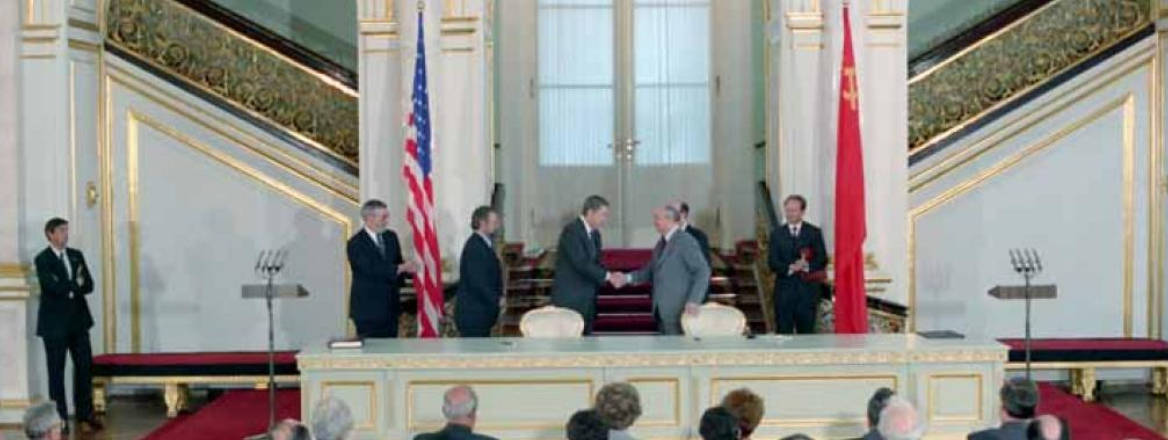The Impending Demise of the INF Treaty: Britain Has a Job on Its Hands
President Donald Trump’s announcement that the US will withdraw from a landmark nuclear treaty comes at a bad time for the UK. Still, if damage to British security is to be limited, deft diplomatic handling from London will be required.
US President Donald Trump announced at a campaign rally that the US would be withdrawing from the 1987 Intermediate-Range Nuclear Forces (INF) Treaty, which prohibits both the US and Russia from deploying any ground-launched cruise or ballistic missiles of ranges between 500 and 5,500km. While the US believes Russia to be in violation of the treaty already, its full abrogation would have serious consequences for the UK at a time when the government in London is already struggling under the weight of Brexit and a strained transatlantic relationship.
The INF Treaty’s benefits for the UK’s security are largely down to geography. With ranges insufficient to reach the continental US apart from the US state of Alaska, the six different types of Soviet missiles dismantled under the treaty were primarily aimed at European NATO states. The most feared among them was the SS-20 Saber, the modernised version of which could carry three warheads, each possessing a yield of ten Hiroshima-type bombs. The Soviets deployed over 400 SS-20s during the 1980s, and their destruction removed a significant threat to Western Europe.
The INF Treaty was also important for what it excluded from limitations. The treaty only applied to ground-based launchers, meaning that NATO could deploy as many sea- and air-launched systems as it liked. This was advantageous to the Alliance, given its leads in advanced sea- and air-launched cruise missiles. While Russia has made significant advances in cruise missile technology in recent years, the ban on land-based systems only is still a net benefit to the US and NATO.
However, all was not well with INF before Trump’s announcement. Since 2014, the US has publicly accused Russia of breaking the treaty. These claims have increasingly focused on the 9M729, a cruise missile that Washington believes violates the treaty’s limits. Not only has Russia apparently tested the 9M729, but it has allegedly deployed the system to at least one base. While none of the intelligence relating to the system has been published, it is compelling enough for NATO Secretary General Jens Stoltenberg to describe Russian violation as ‘the most plausible conclusion’, given the evidence and Moscow’s refusal to discuss the matter.
Why should the UK push for the treaty’s maintenance if Russia has probably already broken it? Firstly, if the US were to withdraw, then Russian deployments would be completely unconstrained at a time when US plans for a symmetrical system are years away from fruition. The Trump administration has appropriated money for a new ground-based intermediate-range missile, but it is in the very early stages of research and development. While the project gets going, the US could counter Russian INF deployments with sea- and air-launched systems as a means to increase the pressure on Moscow to return to compliance, while at the same time avoiding violation of the treaty.
Secondly, INF withdrawal will be highly divisive within NATO, further weakening Alliance cohesion during a delicate period. German Foreign Minister Heiko Maas has described Trump’s announcement as ‘regrettable’, reiterated Berlin’s view of the INF Treaty as ‘an important pillar of our European security architecture’ and urged both the US and Russia to reconsider their stances. By contrast, Defence Secretary Gavin Williamson has attempted to straddle the divide between Washington and Berlin, underlining that the UK is in lock step with the US, while at the same time expressing the wish that ‘this treaty continue to stand’.
UK efforts to maintain NATO unity will become more difficult if Trump goes through with his pledge to withdraw, leading to further dissent within the Alliance at a time when transatlantic ties are increasingly frayed. And NATO divisions would only become deeper if the US pushed for offsetting deployments of some type. Should they agree to host US systems, many European governments would face the prospect of protests similar to those of the early 1980s, and just when they are already facing the wrath of restive publics on a range of issues. But if they refused to provide support for such moves, relations with Washington would sink even lower than they already have.
The prospect of a renewed arms race in Europe and of transatlantic turmoil have come at a terrible moment for the UK, as it struggles to retain its traditional status as a bridge between a US government which seems increasingly indifferent or hostile to the views of its traditional allies, and a Europe that is becoming ever-more alienated from both Washington and London. As Defence Secretary Williamson’s well-crafted comments indicate, however, the UK can still play a constructive role. Its representatives in Washington and European capitals should do everything in their power to avert a final abrogation of the INF Treaty. And, if that effort proves too late, they should concentrate on mitigating the ensuing damage.
James Cameron is a postdoctoral research associate at King’s College London and the author of The Double Game: The Demise of America’s First Missile Defence System and the Rise of the Strategic Arms Limitation (OUP, 2017).
The views expressed in this Commentary are the author's, and do not necessarily reflect those of RUSI or any other institution.

